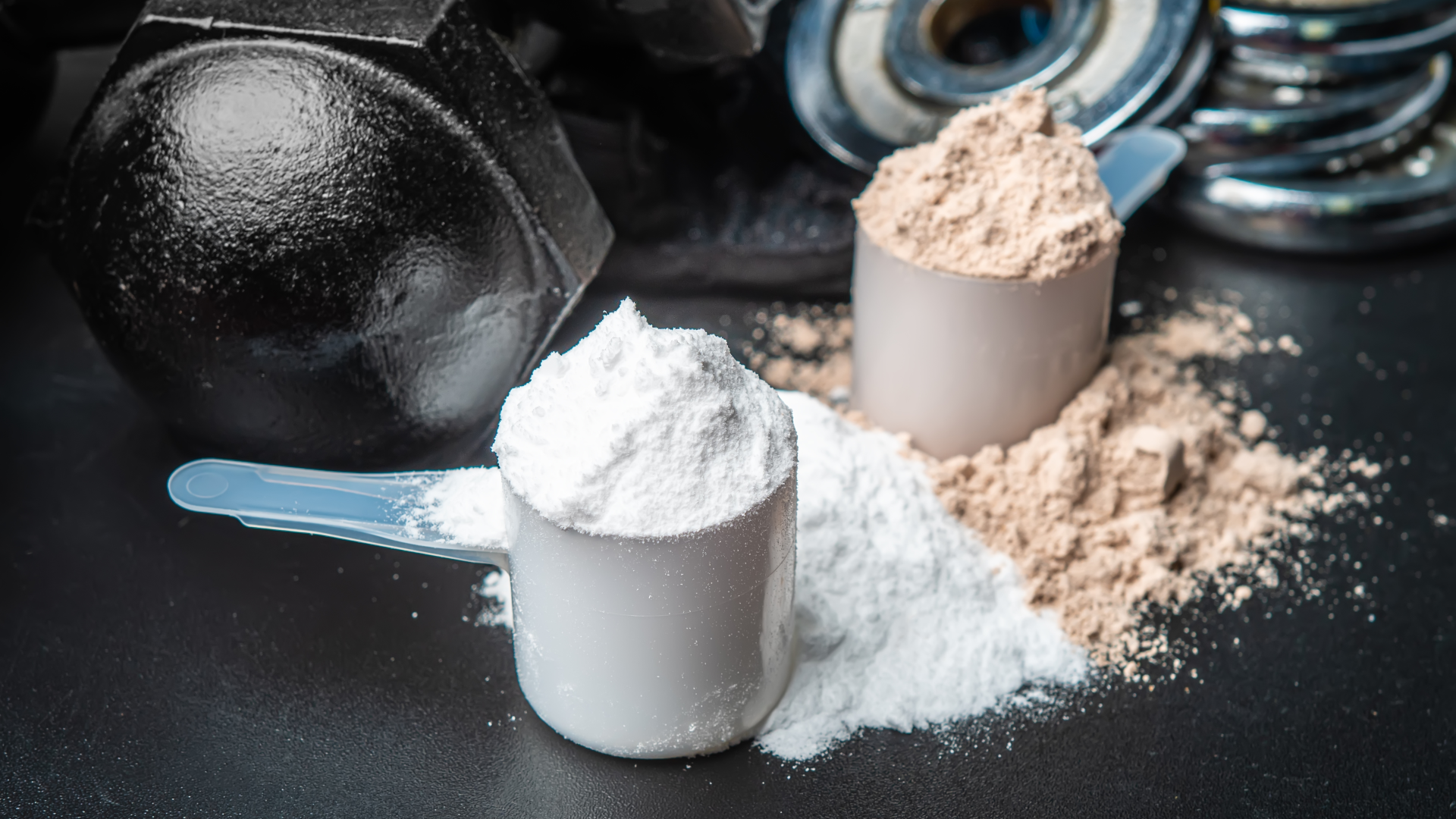Looking to pack on size and strength, but not sure where to start? Mass gainers might be the one for you.
Here, we’re going to dive into how mass gainers can help you overcome the struggle of gaining weight and the science behind their muscle-boosting abilities.
No extras, no fluff—just what you need to know to make the right choice and start gaining mass effectively.
Let’s go.
Understanding mass gainers and their role in weight gain
Mass gainers are supplements designed to help people gain weight, especially muscle mass.
These calorie-dense products are particularly beneficial for athletes or regular gym-goers who need to consume a greater number of calories due to their high levels of physical activity.
They’re also a game-changer for people who struggle to consume enough calories through food alone.
With so many weight gainer products to choose from, it’s important to understand their composition and how they can support muscle growth. That’s where we come in.
The composition of mass gainers
At their core, mass gainers are a blend of macronutrients—proteins, carbohydrates, and high-quality fats—which are essential for gaining weight.
The proportion of protein to carbohydrates in mass gainers can vary, generally ranging from 1:3 to 1:5 to offer maximum mass gains.
Quality mass gainers often derive their protein from various sources, like casein, whey, and milk to provide a sustained release of amino acids for muscle growth.
FYI: A typical 135g serving of a mass gainer might include about 40g of protein, 66g of carbohydrates, 8.9g of fat, and a total of 520 calories.
Calorie content and quality
The high-calorie content of mass gainers helps budding bodybuilders achieve a significant calorie surplus, which is necessary for muscle building—along with a balanced diet rich in the right macronutrients.
A single serving of a calorie-dense mass gainer can offer…
- As much as 1250 calories
- Predominantly carbohydrates
- A substantial amount of protein
- Minimal fat
When to add mass gainers to your diet
Knowing when to add mass gainers into your diet can significantly enhance their effectiveness. For the best results, you should take them…
- After workouts
- In the morning
- Between meals
- As a post-workout supplement to support muscle-building
The post-workout phase is one of the best times to take mass gainers due to heightened muscle protein synthesis, aiding in muscle tissue repair and growth.
As a general rule of thumb, you should take mass gainers once or twice a day, with the dosage adjusted according to the frequency to avoid replacing whole-food meals.
Choosing the right mass gainer supplement for you
Choosing the right mass gainer can feel like navigating a labyrinth. With an ever-growing range of options available, how can you ensure you’re selecting the one that best suits your needs? Well, we’ll tell you.
A good mass gainer should contain minimal fat, with one to two grams of saturated fat per serving, and include healthy fats like MCTs, Omega-3s, and CLA.
Plus, the market provides a variety of options to cater to different dietary needs and preferences—including protein powders, protein snacks, and vegan mass gainers.
Check the nutrition
When choosing a mass gainer, you should take a good look at its nutritional profile.
Good mass gainers will include a balanced mix of protein, carbohydrates, and fats to support muscle growth as well as energy.
Most mass gainers should provide a significant calorie boost, often ranging from 500 to 1,000 calories per serving to help muscle-builders reach their daily surplus goals.
The best mass gainers should feature a specific ratio of proteins to carbohydrates, generally between 1:3 to 1:5, to support both energy production and muscle building.
Additives like creatine can contribute to increased muscle mass and strength, enhancing the body-boosting benefits of resistance training.
Considering special dietary requirements
Your dietary requirements and restrictions should play a significant role in your mass gainer selection.
For instance, people with lactose intolerance require specialized supplements. Thankfully, lactose-free and vegan dieters need mass gainers that align with their plant-based dietary restrictions.
Related: 5 Tips To Maximize Mass Gainer Results
How mass gainers support muscle growth and recovery

Mass gainers aren’t just about helping you gain weight—they play a crucial role in supporting muscle growth and recovery.
A high protein and carbohydrate content make gainers highly beneficial as a post-workout shake to aid muscle recovery and promote muscle growth.
Common ingredients in mass gainers, like whey protein, contribute to.
- Muscle growth
- Weight loss
- Post-exercise recovery
- Overall well-being
Gradually increasing the consumption of mass gainers can help prevent bloating and allows the digestive system to accustom itself to the increased caloric intake.
Protein and amino Acids
Protein and amino acids are the building blocks of your muscles. These compounds are critical for the repair and growth of muscles—mainly through the process of muscle protein synthesis.
High-quality mass gainers generally contain a blend of different protein sources, such as casein, whey, and milk protein, with a suitable carbohydrate-to-protein ratio to maximize muscle growth.
TIP: For optimal muscle recovery and growth, we recommend taking shakes between meals and post-workout, aiming for an intake of around 1000 calories that includes approximately 40–50 grams of protein.
Carbohydrates for energy
Carbohydrates play a crucial role in your workout routine by restoring muscle glycogen and providing energy for effective training sessions. Now, let’s get into the science behind it.
Muscle glycogen is essential for recovery and exercise performance, with a phase of rapid glycogen resynthesis taking place during the first 30 to 60 minutes following exercise.
You can achieve effective muscle glycogen restoration post-exercise by consuming carbohydrates at about 1.2 grams per kilogram of body weight per hour.
Added nutrients and vitamins
Mass gainers are more than just a calorie-packed supplement. They often contain a spectrum of vitamins and minerals that promote overall health, in addition to muscle recovery and growth.
Some of the key nutrients found in mass gainers include…
- Vitamin D: This aids protein synthesis and testosterone production, both crucial for muscle development
- Zinc: This supports cell growth and immune function
- Antioxidants: This aids muscle recovery by repairing tissue and defending against oxidative stress from intense workouts
Micronutrients, including potassium and sodium, are crucial for fluid balance and function post-exercise.
The inclusion of added nutrients and vitamins makes mass gainers not just a source of calories, but a more comprehensive option for nutritional support during muscle building and recovery.
What are the benefits of taking mass gainers?

Mass gainers offer a treasure trove of body-boosting benefits. Let’s take a look at them right now…
- Caloric Surplus: Mass gainers provide a convenient way to consume a significant number of calories quickly.
- Convenience: Mass gainers are convenient for people with busy schedules who may find it challenging to prepare and eat multiple high-calorie meals throughout the day.
- Macronutrient balance: Mass gainers often contain a balanced ratio of macronutrients, including carbohydrates, proteins, and fats, which can be beneficial for muscle recovery and overall nutrition
- Time-Saving: Mass gainer shakes are a quick and efficient way to get a colossal amount of nutrients, making it easier to meet your nutritional goals
Note: Check with your healthcare provider before taking any supplement or new regime— especially if you have a health condition or are taking any medication.
What are the side effects of taking mass gainers?
While mass gainer products can be beneficial for some users, it's important to be aware of potential side effects—especially if you take them to excess or have any pre-existing health conditions.
Here are some potential side effects associated with taking mass gainers…
- Digestive Issues: Mass gainers often contain a high amount of calories and nutrients, which can be hard for some individuals to digest. This may lead to bloating, gas, and gastrointestinal discomfort
- Excess weight Gain: Excessive consumption may lead to rapid and unhealthy weight gain
- High sugar content: Excessive sugar intake can contribute to insulin spikes, fat storage, and may have negative effects on health
- Insulin sensitivity: Regularly consuming large amounts of carbohydrates and sugars may impact insulin sensitivity, increasing the risk of insulin resistance over time.
- Nutrient imbalance: Relying too heavily on the chosen product for nutrition may lead to an imbalance in macronutrients and micronutrients. Whole foods offer a wider range of essential nutrients
- Allergic reactions: Some people may be sensitive or allergic to certain ingredients like lactose, soy, or gluten
- Liver and kidney stress: Excessive protein intake can put additional stress on the liver and kidneys. People with pre-existing kidney or liver conditions should consult with a healthcare professional
- Overconsumption of calories: If not used in conjunction with a proper training regimen, the excess calorie intake may lead to fat gain rather than lean muscle mass.
How do I take mass gainers?
While mass gainers are a powerful tool in your weight gain goal, they should be used to supplement a balanced diet, rather than replace whole foods.
Integrating mass gainers with a diverse array of whole foods ensures that dietary intake includes essential micronutrients not usually present in mass gainers.
Plus, nutritionists recommend using mass gainers as an efficient method to boost calorie intake—especially for individuals struggling to consume sufficient calories from whole foods alone.
Balancing macronutrients
When using mass gainers to add mass, balancing total caloric intake with planned meals helps maintain overall good body shape.
To ensure muscular growth without excess fat gain, it’s essential to calculate daily macronutrient needs—including the calories provided by mass gainers.
Avoiding excessive calorie intake
While it may be tempting to consume mass gainers liberally to achieve quicker results, it’s crucial to avoid excessive calorie intake.
Overeating calories, even from supplements, can lead to fat gain instead of the desired muscle mass.
Monitoring outcomes after two weeks and adjusting your mass gainer calorie intake as needed can help you find your muscle-boosting sweet spot.
Meal planning tips
Meal planning can be a game-changer when integrating mass gainers into your diet. Meals and snacks should be based on whole foods as the foundation.
When included with regular meals, supplements that help you gain muscle mass, can contribute additional protein and more calories.
To maintain a balance between muscle mass and fat gain, here are some tips…
- Monitor weight gain and adjust the calorie intake from mass gainers for a sustainable rate of gain
- Establish a calorie baseline and then add mass gainer shakes to the diet to effectively increase daily calorie intake without excessive consumption
- Split the recommended daily amount of mass gainer into two (or more) smaller shakes to help control calorie intake and manage satiety throughout the day
By following these tips, you can achieve a balanced approach to muscle gain and body fat loss.
Mass gainers vs. protein powders: Understanding the difference

While mass gainers and protein powders may seem similar, they differ in their primary purpose, usage, and nutritional composition.
Mass gainers, with their high protein and carbohydrate content, are designed to aid in bulking up by providing a substantial amount of both macronutrients.
On the other hand, standard protein powders typically focus on a higher protein content with minimal other macronutrients.
Both mass gainers and protein powders may contain whey protein, but mass gainers usually also include casein protein and complex carbohydrates like maltodextrin.
Primary purpose and usage
Mass gainers are used to aid in increasing muscle mass and weight by providing extra calories, catering to individuals on a bulking program.
In contrast, protein powder, like whey, is used to…
- Supplement protein intake
- Support muscle growth and maintenance
Related: Mass gain vs. whey protein: Which one should you take?
Establishing small changes can lead to long-term success in achieving muscle gains and building mass with the help of mass gainers.
Recommended serving sizes
The serving size of mass gainers should be tailored according to an individual’s metabolic rate, activity level, and weight gain goals.
It’s recommended to start with a smaller quantity and to increase the amount gradually as the body adapts to the changes.
Tip: Always beware of the scoop size provided by the mass gainer brand, as varying brands have different scoop sizes and recommended serving quantities.
Following proper mixing instructions is important to get the very best from your mass gainer.
Combining with Exercise
Combining mass gainer supplements with an appropriate exercise routine is crucial, as the supplements alone cannot differentiate between muscle and fat gain.
Using mass gainers after a workout can be beneficial as the body is in a state of heightened muscle protein synthesis, requiring nutrients to repair and rebuild muscle tissue.
Here are some tips for maximizing the benefits of mass gainer supplements…
- Consume mass gainers after your workout, when your body is in a state of heightened muscle protein synthesis
- Make sure to include carbohydrates in your post-workout meal to replenish energy stores and enhance muscle glycogen resynthesis
- Follow a proper exercise routine that includes both resistance training and cardiovascular exercise
- Stay consistent with your supplement intake and exercise routine to see long-term results
Meet the Crazy Nutrition mass gainer…
Promoting muscle growth while focusing on tip-top nutrition makes Crazy Nutrition’s Mass Gainer a popular choice for health-conscious people the world over.
The mass gainer contains unique ingredients like DigeZyme®, which counteracts stomach upset or bloating, helps to reduce sugar spikes and improves nutrient absorption (which is a huge bonus).
Our body-boosting mass gainer also contains essential vitamins and minerals to help support the demands of your workouts.
The chocolate and vanilla flavors taste amazing and are as good as we’ve tried. It has a high number of calories per serving, and it’s suitable for vegetarians too. Go get some.
FAQs
Are mass gainers good for you?
Mass gainers can be good for you if you struggle to meet your high-calorie needs and need a boost.
But, it should be taken in tandem with a solid nutrition plan that meets your macro and micronutrient requirements.
Which mass gainer is most effective?
One of the most effective products on the market is Crazy Nutrition’s popular Mass Gainer as its healthy, balanced, and will help you achieve your bulking goals in the best possible way.



